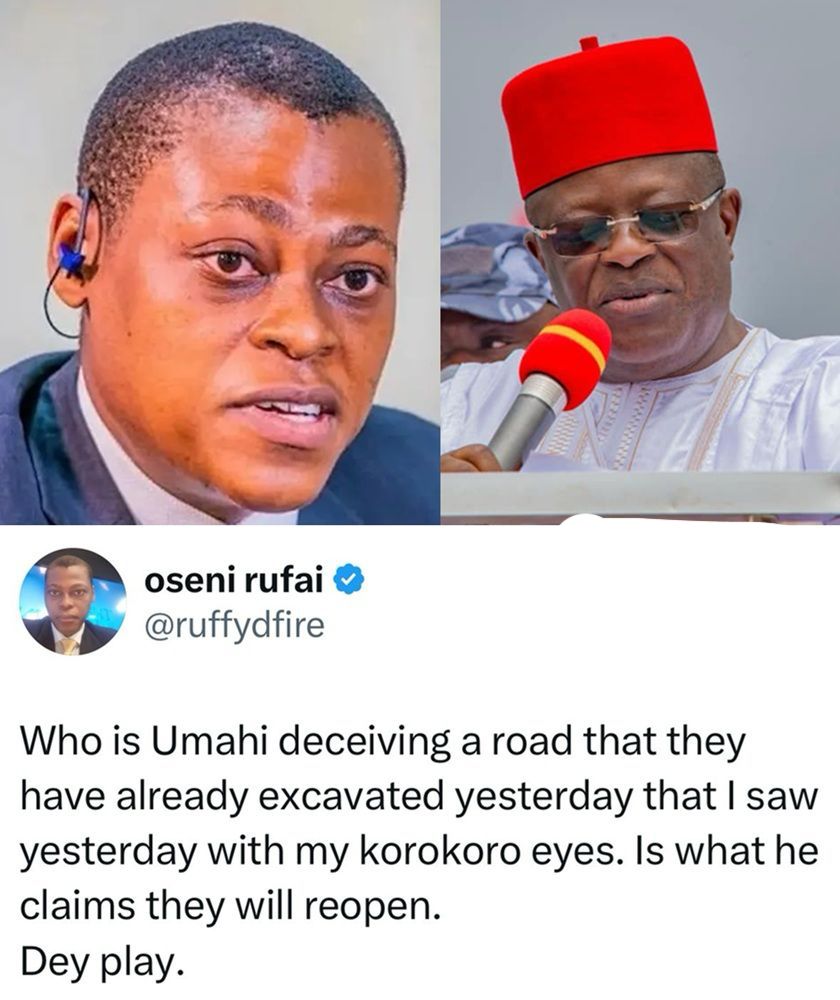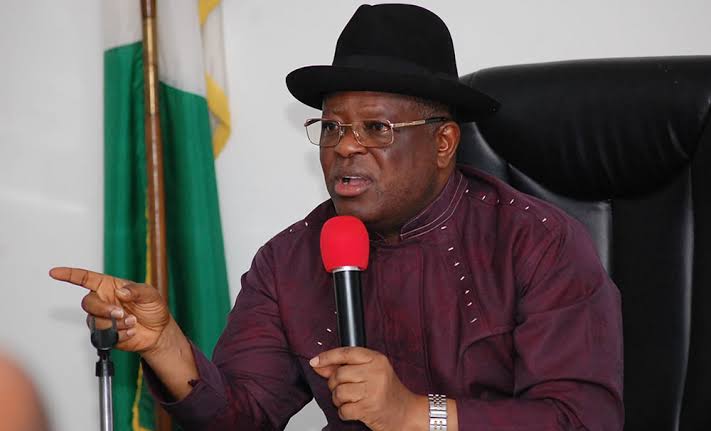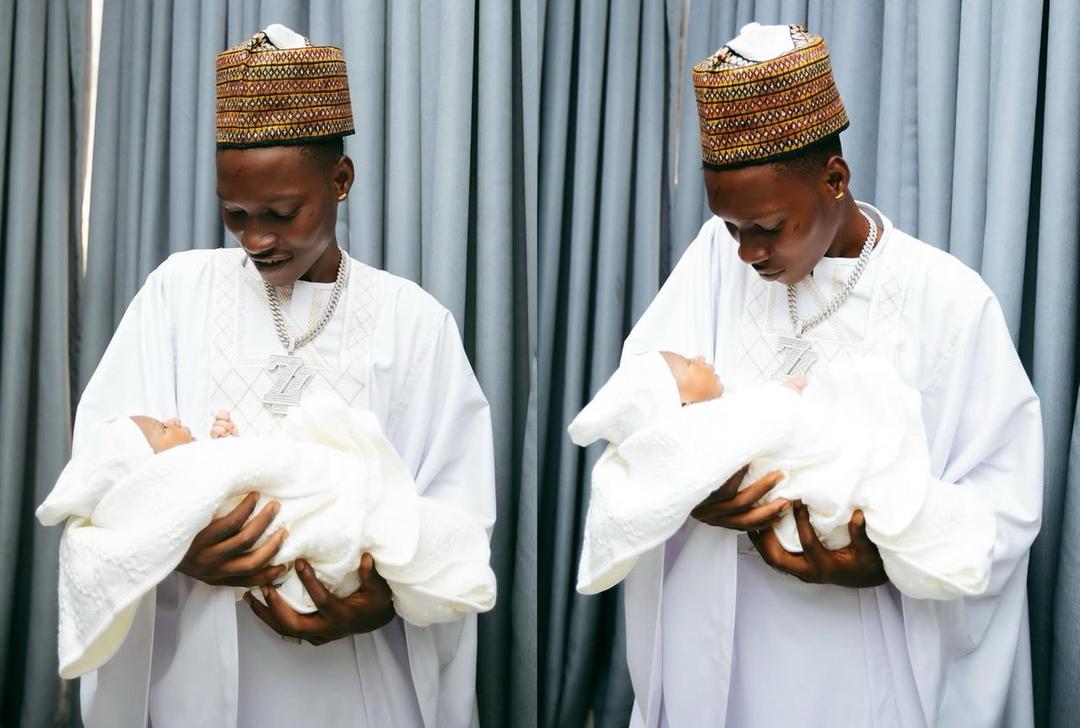
Title: \"Lagos Traffic Crisis: Rufai Oseni Questions Minister Umahi\'s Reopening of Independence Bridge\"

In a dramatic twist to the ongoing Lagos traffic situation, journalist Rufai Oseni has expressed deep skepticism about the recent decision made by the Minister of Works and Housing, David Umahi, to reopen the Independence Bridge in Lagos. The bridge, which has been a significant point of congestion in the bustling city, was temporarily closed for repairs to address the city’s worsening traffic problems. However, Oseni\'s reaction has sparked a debate on the practicality of the reopening and whether it truly addresses the root cause of Lagos\' persistent traffic woes.
On April 2, 2025, Minister David Umahi announced that the Independence Bridge, located in the heart of Lagos, would be reopened following urgent repairs that were meant to alleviate the massive traffic jams plaguing the city. The bridge, one of the busiest in Lagos, had been shut down for a considerable time to allow for significant maintenance works aimed at improving traffic flow. Umahi\'s announcement of the reopening was framed as a solution to the continuous gridlock that has become a daily nightmare for Lagos commuters.
In his statement, Umahi emphasized that the bridge was an essential part of the city’s infrastructure and that its reopening would relieve some of the pressure on alternative routes, which have been clogged with vehicles in the wake of the closure. He assured citizens that the reopening was a well-thought-out decision, aimed at reducing the transportation bottleneck that has plagued the city.
However, the announcement has not been received without criticism, particularly from seasoned journalist Rufai Oseni, who took to social media to express his doubts about the effectiveness of Umahi\'s move. Oseni, known for his candid and sometimes controversial opinions, raised several concerns about the integrity of the repairs and the true intentions behind the reopening.
Rufai Oseni, a respected voice in Nigerian journalism, did not hold back in his critique of the Minister’s announcement. Taking to Twitter and other platforms, Oseni questioned the authenticity of Umahi’s claims about the state of the bridge. According to Oseni, he personally witnessed the extent of the excavation work that had been carried out on the bridge just a day before the announcement.
Oseni’s viral post reads: \"Who is Umahi deceiving? A road that they have already excavated yesterday that I saw with my korokoro eyes. Is what he claims they will reopen? Dey play.\"
The journalist\'s comments were met with a mix of support and outrage, with many agreeing with his skepticism, while others accused him of undermining the efforts of the Ministry. Oseni’s sharp observation raised eyebrows as he drew attention to the fact that while Umahi claimed the bridge would be ready for traffic soon, there were clear signs that the repair works were still far from completion.
Oseni’s reference to his \"korokoro eyes\" was a pointed way of stressing his firsthand knowledge of the situation, underscoring his belief that the bridge was far from being in a condition suitable for public use. His remarks seemed to suggest that the reopening was more about political optics than actual infrastructure improvements.
The reaction from Oseni has raised questions about the political motivations behind the timing of the reopening. Lagos, the commercial capital of Nigeria, is notorious for its traffic congestion, which has been exacerbated by ongoing construction projects and the rapid increase in population. Traffic in the city has become a daily struggle for residents, and the reopening of the Independence Bridge has become a high-profile issue.
For Umahi, a prominent political figure who recently assumed office as the Minister of Works and Housing, the decision to reopen the bridge could be seen as an attempt to deliver on campaign promises and improve his public image. With the 2025 general elections on the horizon, political observers suggest that the Minister’s push for reopening major infrastructure projects like the Independence Bridge could be a strategic move to consolidate his popularity.
However, critics like Oseni argue that the government is more interested in creating the illusion of progress rather than making tangible changes that will actually improve the daily lives of Lagosians. Oseni’s accusation that Umahi is “deceiving” the public suggests a deeper frustration with what he perceives as empty promises from political leaders who fail to address the systemic issues facing the city\'s infrastructure.
While the reopening of the Independence Bridge may provide temporary relief, many experts argue that it does not address the deeper issues contributing to Lagos\' chronic traffic congestion. The city\'s road network, though constantly being expanded and renovated, is still unable to meet the growing demand from the increasing number of vehicles on the road.
The Independence Bridge is just one part of a much larger issue. The traffic congestion in Lagos is largely driven by the lack of efficient mass transit systems, poor urban planning, and inadequate road maintenance. A bridge, even if reopened, is unlikely to offer a lasting solution unless these larger, systemic issues are addressed.
Experts argue that the city needs a comprehensive approach that includes investing in reliable public transportation systems like buses and trains, improving road networks, and implementing better traffic management strategies. Simply reopening a single bridge may relieve some traffic in the short term, but it is not a sustainable solution.
Following Oseni’s scathing comments, the public has weighed in with mixed opinions. Some residents of Lagos expressed their frustrations, agreeing with Oseni that the government\'s approach to solving the traffic problem seems more superficial than substantive. Many pointed to other areas of Lagos where roads have been left in disrepair for months, if not years, without any major interventions.
On the other hand, some residents have welcomed the reopening, viewing it as a positive development in a city that has long struggled with poor infrastructure. These individuals argue that any improvement to the road network, even if it’s just reopening an existing bridge, is a step in the right direction.
However, both sides of the debate seem to agree on one thing: there is a pressing need for the government to do more. Whether or not the Independence Bridge reopening is a genuine attempt to solve the problem or simply a political gesture remains to be seen, but Lagosians are desperate for real, lasting solutions.
As Lagosians brace themselves for the reopening of the Independence Bridge, the city remains caught in a larger debate about how best to tackle its ongoing traffic crisis. Rufai Oseni’s bold criticism of Minister Umahi’s decision has brought to light questions about the credibility of the government\'s claims, and whether political posturing is getting in the way of true infrastructural progress.
For now, the bridge may reopen, but it is clear that Lagos\' traffic problems are far from solved. Whether the government will take the necessary steps to address the root causes of congestion, or continue to offer temporary fixes, remains the critical question on everyone’s mind.


